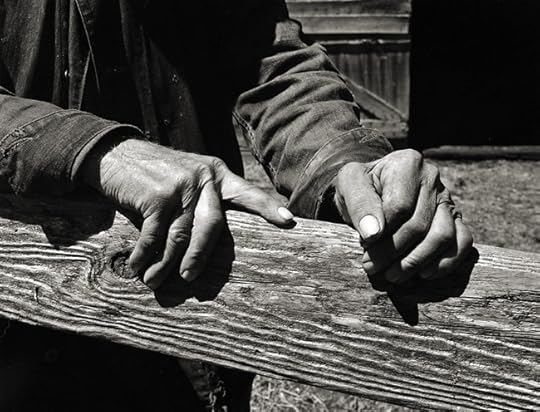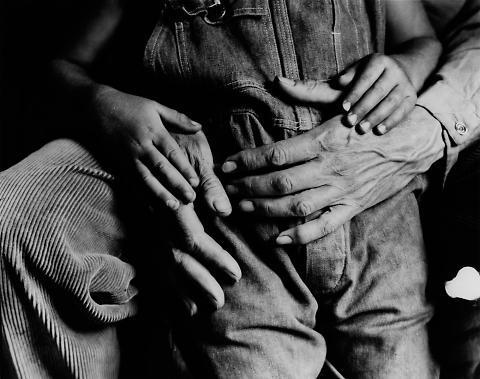What Work Is
Looking at My Hands
“A hand turned upward holds only a single, transparent question.”
--Jane Hirshfield, “A Hand”
These peasant hands, shovel size, cracked knuckles,
holds no transparencies. The age between
creases, packed thick as gardener’s dirt,
would tell you I work the fields or send shuttles
across large looms. It says I shuck corn, bait lines,
hack tree limbs, knot ropes. It says I force
myself into a cow haul out a calf, slick
with mucus and blood.
They lie. I do no hard work
but tap endlessly with four fingers on a keyboard
like some erratic god, bringing a semblance of life
into my increasingly populated world.
© 2013 Jane Yolen, all rights reserved.
From "Labor Pains: The Loneliness of the Working Class Writer," by Valerie
Miner:
"Every day I wonder whether writing is a form of lunacy or of
betrayal. One of my parents didn't go past eight grade, the other didn't
finish high school. There were no books in our house, no symphonies on
the Victrola, no high drama except at the dinner table. One brother grew
up to be a carpenter, the other works for a maritime union. I've always
carried the suspicion that laboring with words is not real work. I ask
myself: Does writing mean anything? Do I have the right to feel tired at
the week's end? Shouldn't I be doing something useful?"
From "What Work Is" by Philip Levine :
We stand in the rain in a long line
waiting at Ford Highland Park. For work.
You know what work is—if you’re
old enough to read this you know what
work is, although you may not do it.
Forget you. This is about waiting,
shifting from one foot to another.
Feeling the light rain falling like mist
into your hair, blurring your vision
until you think you see your own brother
ahead of you, maybe ten places.
You rub your glasses with your fingers,
and of course it’s someone else’s brother,
narrower across the shoulders than
yours but with the same sad slouch, the grin
that does not hide the stubbornness,
the sad refusal to give in to
rain, to the hours of wasted waiting,
to the knowledge that somewhere ahead
a man is waiting who will say, “No,
we’re not hiring today,” for any
reason he wants.
(Read the full poem here.)
I've kept a torn, creased, yellowing copy of Valerie Miner's article "Labor Pains" ever since I first clipped it out of The Village Voice in the 1980s. Back then, it felt sharply, almost painfully relevant to me, as a woman from a blue-collar background who had crossed a line (invisible, little-discussed, but distinct) in entering the white-collar world of New York's book publishing industry. As the daughter of a truck driver, whose brothers all worked with their hands, it seemed, in those days, both miraculous and strange that someone was willing to pay me to read and write books. Thirty years later, my firm belief is that storytelling in all its
artistic forms is useful work indeed, soul-sustaining and necessary
for art makers and partakers alike. And yet the questions raised by
the poems, quotes, and photographs here still linger....
Your thoughts?

The images above: Two photographs of Georgia O'Keefe's hands by Alfred Steiglitz (1864-1946), "Hands Washing" by Tina Modatti (1896-1942), "Wright Morris' Hands" and "Maynard & Dan Dixon's Hands" by Dorothea Lange (1895-1965), and "The Puppeteers Hands" by Tina Modotti. (I particularly love the last one because my husband is a puppeteer.)
Terri Windling's Blog
- Terri Windling's profile
- 712 followers








